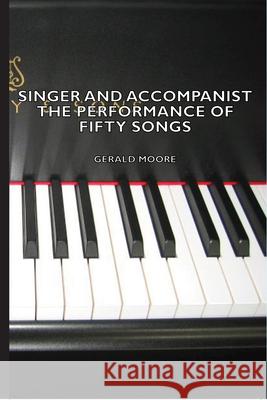Singer And Accompanist - The Performance Of Fifty Songs » książka
Singer And Accompanist - The Performance Of Fifty Songs
ISBN-13: 9781443731188 / Angielski / Twarda / 2008 / 248 str.
Singer And Accompanist - The Performance Of Fifty Songs
ISBN-13: 9781443731188 / Angielski / Twarda / 2008 / 248 str.
(netto: 191,57 VAT: 5%)
Najniższa cena z 30 dni: 199,49
ok. 16-18 dni roboczych.
Darmowa dostawa!
SINGER AND ACCOMPANIST The Performance of Fifty Songs by GERALD MOORE. PREFACE: IT has not been my intention in the following pages to attempt critical analyses of the fifty songs under review although an analytical note may occasionally have crept in but rather to explain how the execu tants might sing and play them above all to suggest lines they could think along when practising, rehearsing, and performing them. I hope the word suggest 5 will be noted. I have used it advisedly for there are many roads to heaven and while I am confident that my road will not lead to destruction, I do not claim that it is the only way. Let him who disagrees with my ideas make his own investigation and find out what suits him best. I shall be happy if this book has this stimulating effect. I believe that equal consideration has been given to the two partners, but if more attention than is usual in a book on song interpret ation has been bestowed on the accompaniment I make no apology it has been done for the good of the song and should prove of ultimate benefit to the singer. There is no law, human or divine said Ernest Newman in 1907, to compel the composer to limit his expressiveness to the voice alone. The Schubert, Wolf, Faure songs to mention three composers at random included here can be called great songs. To the question What are Beethovens Mailied, Rachmaninoffs Spring Waters, Hahns Offrande doing in such distinguished company 5 I would answer that the first song presents difficulties to the singer a the second teases the pianist, while the Hahn song is intriguing if only for its wide dissimilarity to the undeniably finer settings of the same poem by Debussy and Faur6. The only rule I observed when selecting my fifty songs was that they should be interesting interesting either for their intrinsic worth or for the problems they pose for the singer or the accompanist or both partners. The reader who is indulgent enough to imagine there is any benefit to be reaped by a study of this book, should dip into it rather than attempt to read it steadily from cover to cover. Let him see which of these songs he possesses and then after numbering the bars on his score to help him follow me on my wanderings through the song have his music beside him as he reads. He will thus be in a much better position to laugh with me or at me to see how unerringly I hit the nail on the head or how lamentable is my aim.
SINGER AND ACCOMPANIST The Performance of Fifty Songs by GERALD MOORE. PREFACE: IT has not been my intention in the following pages to attempt critical analyses of the fifty songs under review although an analytical note may occasionally have crept in but rather to explain how the execu tants might sing and play them above all to suggest lines they could think along when practising, rehearsing, and performing them. I hope the word suggest 5 will be noted. I have used it advisedly for there are many roads to heaven and while I am confident that my road will not lead to destruction, I do not claim that it is the only way. Let him who disagrees with my ideas make his own investigation and find out what suits him best. I shall be happy if this book has this stimulating effect. I believe that equal consideration has been given to the two partners, but if more attention than is usual in a book on song interpret ation has been bestowed on the accompaniment I make no apology it has been done for the good of the song and should prove of ultimate benefit to the singer. There is no law, human or divine said Ernest Newman in 1907, to compel the composer to limit his expressiveness to the voice alone. The Schubert, Wolf, Faure songs to mention three composers at random included here can be called great songs. To the question What are Beethovens Mailied, Rachmaninoffs Spring Waters, Hahns Offrande doing in such distinguished company 5 I would answer that the first song presents difficulties to the singer a the second teases the pianist, while the Hahn song is intriguing if only for its wide dissimilarity to the undeniably finer settings of the same poem by Debussy and Faur6. The only rule I observed when selecting my fifty songs was that they should be interesting interesting either for their intrinsic worth or for the problems they pose for the singer or the accompanist or both partners. The reader who is indulgent enough to imagine there is any benefit to be reaped by a study of this book, should dip into it rather than attempt to read it steadily from cover to cover. Let him see which of these songs he possesses and then after numbering the bars on his score to help him follow me on my wanderings through the song have his music beside him as he reads. He will thus be in a much better position to laugh with me or at me to see how unerringly I hit the nail on the head or how lamentable is my aim.











